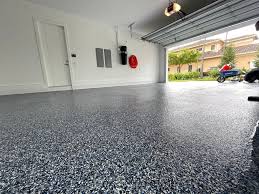Revamping a garage floor with epoxy has become a popular home improvement trend, promising a durable and visually appealing surface. In this article, we explore the benefits and drawbacks of epoxy flooring, delve into its cost-effectiveness for a DIY 2-car garage project and address its potential disadvantages.
I. Is it worth it to epoxy your garage floor?
Epoxy garage flooring is a tempting option for many homeowners due to its impressive list of advantages. Not only does epoxy create a smooth and seamless surface, but it also provides resistance to stains, chemicals and abrasions, making it an excellent choice for high-traffic areas like garages. Moreover, epoxy floors are easy to clean and maintain, adding to their appeal. The long-lasting nature of epoxy can justify the initial investment, as it can keep your garage floor looking pristine for many years to come.
II. What is the downside to epoxy a garage?
While epoxy flooring offers numerous benefits, it’s essential to acknowledge its downsides. One significant drawback is the preparation required before applying epoxy. Properly prepping the garage floor, including cleaning, repairing cracks and ensuring a smooth surface, is crucial for the epoxy to adhere effectively. This preparation process can be time-consuming and may deter some homeowners from undertaking the project themselves. Additionally, epoxy is not entirely immune to damage, as heavy impacts or sharp objects can cause chipping or cracking, although these issues can often be repaired with touch-up kits.
III. How much does it cost to epoxy a 2-car garage floor DIY?
The cost of epoxy flooring can vary based on several factors, such as the size of the garage, the condition of the floor and the type of epoxy used. For a standard 2-car garage, the DIY epoxy systems cost ranges from $600 to $700 depending on options. This price includes the epoxy coating, tools, cleaning supplies, optional primer and top coat. However, it is essential to consider additional expenses like repair materials if needed, and personal protective equipment (PPE) for safety during the application process. Compared to hiring a professional contractor, doing it yourself can save you a significant amount of money.
IV. What are the disadvantages of epoxy flooring?
Despite its many advantages, epoxy flooring does have some disadvantages that potential users should be aware of. Firstly, epoxy floors are susceptible to damage from exposure to UV light, which can lead to yellowing or discoloration over time if the garage receives direct sunlight. To mitigate this issue, it is advisable to use UV-resistant top coats or apply an additional protective layer.
Secondly, epoxy can become slippery when wet, presenting a potential safety hazard. This is especially concerning in a garage, where spills and leaks from vehicles are common. To address this concern, homeowners can choose epoxy coatings with anti-slip additives or use non-slip mats in specific areas to enhance traction.
Lastly, epoxy flooring may not be suitable for garage floors with moisture issues. Excessive moisture can cause the epoxy to delaminate or peel over time, leading to an unsightly and potentially costly problem. It is crucial to address any moisture-related issues before proceeding with the epoxy application.
Conclusion:
Epoxy garage flooring can undoubtedly transform the appearance and functionality of your garage. Its durability, easy maintenance, resistance to stains and chemicals make it a compelling choice for many homeowners. However, it’s essential to weigh the downsides and potential disadvantages before committing to this home improvement project. If you’re up for the challenge of a DIY project, epoxy coating your 2-car garage floor can be a cost-effective option to achieve an impressive and long-lasting result. With proper preparation and consideration of the potential drawbacks, epoxy can be an excellent investment that enhances both the value and usability of your garage space.

